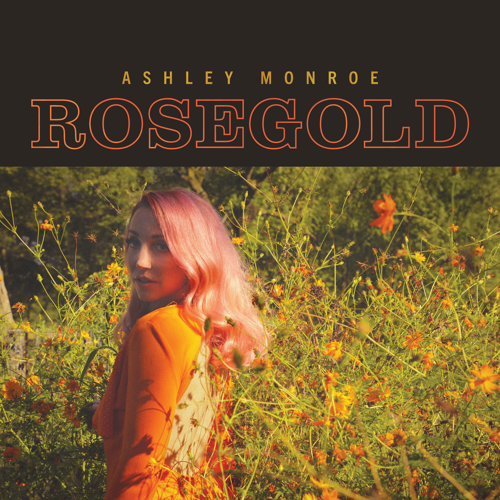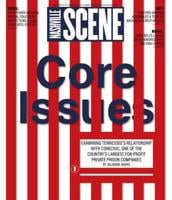
In February, Ashley Monroe released “Drive,” the first single from her new album Rosegold, which is out Friday. The song employs a trippy, Portishead-esque sound, marking a major sonic departure for Monroe. Up to this point, she’s been known as a standout country singer-songwriter who’s also part of the stellar trio Pistol Annies.
“Drive” could easily have been an outlier on a more traditional country album. Instead it’s one of 10 ambitious, genre-agnostic tracks that allowed Monroe to explore the breadth of her musical influences. Like many artists, those influences span far beyond country, and in Monroe’s case, they include contemporary pop, hip-hop, R&B and alternative rock.
Monroe began writing Rosegold not long after the release of her 2018 album Sparrow, a critically acclaimed LP produced by Dave Cobb that features input from country and Americana mainstays like Anderson East, Waylon Payne and Monroe’s Pistol Annies bandmate Angaleena Presley. Though Sparrow has a decidedly moodier sonic palette than Rosegold, hints of the new record appeared in its predecessor’s lush atmosphere.
Monroe’s label at the time, Warner Music Nashville, released her from her contract shortly after Sparrow came out. She admits that the decision hurt initially, but she harbors no ill feelings.
“They had me for so long, and I understand I’m not a big money-making act,” she tells the Scene. “And they’ve put so much money and invested so much into me, so I get it. … I love everyone there. And every label I’ve ever had has been so supportive of me and what I’ve done, and worked their butt off to get me on radio — worked their butt off to get me a ton of stuff. So I’m so grateful, because they got me where I am now.”
Where other artists might have felt discouraged by such a change, Monroe felt inspired to put pen to paper. “Once that ‘feelings hurt’ moment wore off,” she says, “I was like, ‘Well, you aren’t going to stop making music just because you don’t have a label, so just write. Open up your heart.’ ”
She wrote prolifically, penning five of Rosegold’s songs very quickly. That early time period was a fruitful one that yielded many more songs that didn’t make it onto the LP. Monroe explains that this has been a common theme throughout her career.
“I chase whatever melodies come to me, and that’s what I write,” she says. “I started hearing these melodies early in the morning, then I would take an idea or a melody to some of my favorite writers.”
The array of writers Monroe worked with also helped her develop the sound of the record. She recruited Tyler Cain, Nathan Chapman, Jake Mitchell, Mikey Reaves, Jordan Reynolds and Ben West to write with her and to co-produce Rosegold.
The team Monroe assembled helped her achieve her sonic vision, which incorporated influences from Lil Wayne and Kanye West (“I listened closely to all of Kanye’s music,” Monroe says) to Beck, The Beach Boys and Queen, among others. Monroe’s appreciation for hip-hop shows itself in tracks like opener “Siren,” whose vocal rhythm veers into an almost rap-like cadence at times. Standout track “ ’Til It Breaks” uses a dark, Beck-esque beat and layered vocals to craft a slow-burning soundscape for a message of moving forward after hardship.

Despite the many contributors, Rosegold is a cohesive listening experience. Engineer Gena Johnson — a friend and collaborator of Monroe’s who’s also known for her work with John Prine, Amanda Shires, Jason Isbell, Chris Stapleton and many more — was key to making that possible.
“[Making] Sparrow was the first time I met Gena,” Monroe recalls. “She was in my vocal booth, and she had set up a Zen garden. I was like, ‘I like this girl.’ [When it came time to record Rosegold] I called her and I was like, ‘Gena, this stuff is very different. It’s not normal “me,” but I have a really good feeling about it. Do you want to dig into it with me?’ And she did. Then she went and bought a subwoofer for all my big bass so we could really mix well.”
While exploring new sounds was one of Monroe’s missions as she made Rosegold, her primary motivation was to make music that made listeners feel good. Inspired both by the birth of her son Dalton in 2017 and feeling as though she’d exorcised much of her past pain on earlier albums, she set out to write an album grounded in love and positivity.
“I lost my father when I was 13, and life was a big, fat mess and really dark. That’s when I wrote my favorite sad country songs. Those songs helped me get through those moments. Sparrow was a lot of release and forgiveness of those emotions. … [On Rosegold] I wanted to hyper-focus on joy. And I wanted to freeze it and put a beat behind it and harmonize to it and put on another layer of something else. I wanted it to be a miraculous joy surge for anyone who heard it. I love to give people chills, so this time I wanted to give people chills from a place of joy.”






